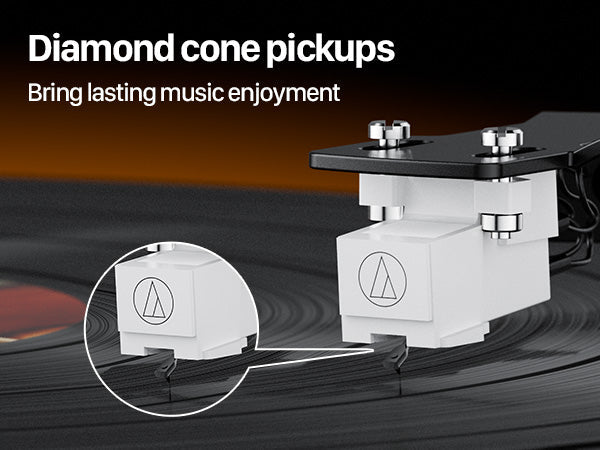Walk into a great comic book shop in 2025. Your senses ignite. The smell of fresh paper and ink. The visual feast of a thousand polychrome covers. And then, you hear it. Not the tinny chatter of a top-40 radio station, but something richer, more deliberate. It’s the soaring, heroic brass fanfare of John Williams’ Superman theme, emanating not from a hidden Bluetooth speaker, but from a turntable spinning proudly on the counter.
This is not a gimmick. It is a strategic masterstroke.
The comic shop owner who places a record player in their store understands a fundamental truth of 21st-century retail: you are no longer selling just products. You are selling an experience. And in the world of fandom, experience is everything. Let's deconstruct the powerful mechanics behind this trend and explore how a simple record player can transform a store into a sanctuary.
The First Principle: The Shop as a Third Place
A brick-and-mortar store cannot compete with the internet on price or convenience. It must win on atmosphere and community. Sociologist Ray Oldenburg called this the "third place"—a space outside of home (first place) and work (second place) where people can gather and connect. A great comic shop is the ultimate third place for fans.
A Spotify playlist is just background noise. A turntable playing a soundtrack is a conscious act of curation. It is a statement from the shop owner that says, "I am a fan, just like you. I care enough to create a specific mood for this space." This deliberate act elevates the store from a mere retail environment to a clubhouse, a shared sanctuary.
Sensory Engineering: The Power of Associative Sound
The human brain is an association machine. When a customer is flipping through a stack of Aquaman comics while Rupert Gregson-Williams' epic, synth-laden score for the film fills the air, something powerful happens.
-
Deepened Immersion: The music acts as a sensory bridge, dissolving the barrier between the customer in the shop and the world of Atlantis on the page. The story is no longer a silent, static object; it has a living, breathing soundtrack. The emotional stakes of the narrative are amplified by the score, making the comic itself more compelling and desirable.
-
Thematic Cohesion: The turntable allows the owner to be a DJ for their own universe. On "Batman Day," the shop can be filled with the gothic, brooding themes of Danny Elfman or Hans Zimmer. During a "Marvel Cosmic" event, the retro-pop stylings of the Guardians of the Galaxy soundtrack can set the tone. This isn't just background music; it's environmental storytelling. It makes the entire store feel like a cohesive, curated experience.
The Analog Allure: Why Vinyl, Specifically?
This effect would be diminished with a digital playlist. The choice of vinyl is critical for two reasons rooted in psychology and physics.
-
The Turntable as Artifact: The record player itself is a beautiful, mechanical object. It has gears, a spinning platter, and a moving tonearm. It feels at home amongst other physical media like comics and graphic novels. It becomes a visual centerpiece, a conversation starter. It signals a respect for physical artifacts, which is the very foundation of comic book collecting. It tells the customer, "We value things here, not just files."
-
The Sound of "Warmth": In a retail environment, audio fatigue is a real issue. The compressed, often harsh high-end of many digital streams can become grating over time. The sound profile of vinyl is often described as "warm" for a reason. Its analog nature tends to have a smoother, less fatiguing quality. It can fill a room for hours without becoming an irritant, providing a pleasant, immersive sonic blanket rather than a sharp, distracting noise.
For a shop owner, investing in a reliable, high-quality turntable is crucial. They need a workhorse that can handle all-day play while still delivering the superior sound that makes the investment worthwhile. A model like the XJ-HOME Recoder is ideal for this application. It combines robust, durable construction with the audiophile-grade components—like an adjustable tonearm and a quality cartridge—needed to make a Superman or Aquaman score sound truly epic. It's a professional tool for creating a professional-grade atmosphere.
Conclusion: The Return on Immersion
The turntable in a comic shop is not there to sell records, though it might. Its primary function is far more important: it is there to sell comics.
It does this by transforming the shopping experience from a transaction into a moment of immersion. It deepens the customer's connection to the characters and stories they love. It fosters a sense of community and shared passion. It makes the store a destination you want to spend time in, not just a place you pass through.
In the ongoing battle for the soul of retail, the comic shop owner spinning a Superman soundtrack on vinyl has chosen a powerful weapon: the creation of a perfect vibe.
Understanding Check: Questions & Answers
1. Question: From a business strategy perspective, what is the true "Return on Investment" (ROI) for a comic shop owner who buys a quality turntable and a library of soundtrack records?
Answer: The true ROI is not measured in record sales. It is measured in metrics related to the core business: selling comics and graphic novels. The primary returns are:
-
Increased Dwell Time: A pleasant, immersive atmosphere encourages customers to stay longer, browse more, and discover new products.
-
Enhanced Brand Identity: The shop is no longer a generic comic store but "the cool shop that plays vinyl," creating a unique brand that fosters loyalty and word-of-mouth marketing.
-
Higher Conversion Rates: By using associative sound to amplify the emotional impact of the comics on the shelves, the store can subtly increase a customer's impulse to buy. The music makes the product more desirable.
The turntable is a tool for enhancing the core business, not starting a new one.
2. Question: Why is the physical, mechanical presence of a turntable more effective at creating an "authentic" fan atmosphere than a hidden, high-quality digital sound system playing the same music?
Answer: The effectiveness lies in the visible act of curation. A hidden digital system is impersonal and could be run by an algorithm. The visible turntable is a deliberate, manual choice made by a human being. It's a piece of theater. Fans see the owner (or employee) select a record, place it on the platter, and lower the needle. This act signals a shared passion and a respect for physical media—the very foundation of comic collecting. It's a transparent display of fandom that builds an immediate, authentic connection with the customer in a way a "black box" digital system cannot.
3. Question: The article claims the "warm" sound of vinyl is less fatiguing in a retail space. From a sonic first-principles perspective, what does this mean?
Answer: This refers to the sonic character and frequency distribution. Digital audio, especially when compressed for streaming, can sometimes have a sharp, pronounced high-end and a "hard" quality. Over long listening periods, this can cause a phenomenon known as listener fatigue. The analog playback process of vinyl—involving a physical stylus, a phono preamp, and the nature of the medium itself—tends to produce a smoother, more rolled-off high-frequency response and a richer mid-range. This sonic signature is less abrasive to the human ear over extended periods. It creates a sound that can exist pleasantly in the background of a space for hours, providing atmosphere without demanding constant, sharp attention, making it ideal for a retail environment.





Leave a comment
All comments are moderated before being published.
This site is protected by hCaptcha and the hCaptcha Privacy Policy and Terms of Service apply.